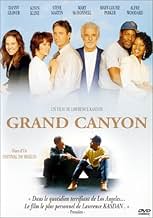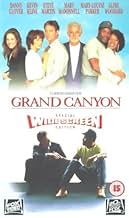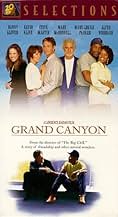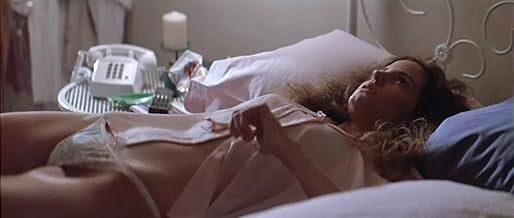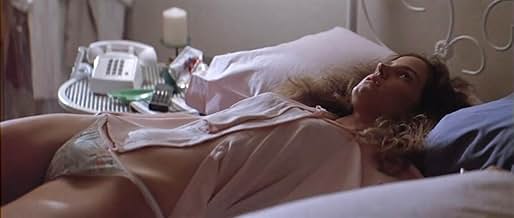VALUTAZIONE IMDb
6,8/10
17.249
LA TUA VALUTAZIONE
I destini di diverse persone si intrecciano in modo casuale. Si supportano reciprocamente, pur affrontando le molteplici differenze nei loro stili di vita.I destini di diverse persone si intrecciano in modo casuale. Si supportano reciprocamente, pur affrontando le molteplici differenze nei loro stili di vita.I destini di diverse persone si intrecciano in modo casuale. Si supportano reciprocamente, pur affrontando le molteplici differenze nei loro stili di vita.
- Candidato a 1 Oscar
- 3 vittorie e 9 candidature totali
Patrick Y. Malone
- Otis
- (as Patrick Malone)
Lauren Mead
- Claire's Baby
- (as Loren Mead)
Recensioni in evidenza
"Grand Canyon" is the rare, fleeting example of a movie handled so truthfully from the start that the journey overwhelms the give-away ending. For a superb 137 minutes flashing by, directing, acting, and screenwriting hit a nearly flawless note. Sucking on this bottle for instant gratification, however, is contra-indicated. Grand Canyon does not leave home with a nursemaid. Those who lust for predictable Hollywood spin with contrived drama and only fantastic elements of human life will feel unsatisfied with Director and Screenwriter (with Meg Kasdan) Lawrence Kasdan's stubborn defiance of proper genre hygiene. Kasdan's visual poetry draws us in to a world of separate images, forcing potential connections to jack-knife through the mind. Yet Kasdan provides no answers, at least not quickly. The radomness deliberately provokes preconditioning that "everything happens for a reason in the movies". Nothing connects. Nothing makes sense in the formula way wished subconciously. After all, one sees movies to escape life, not to immerse in it. The viewer's frustration peaks and the introspective see Kasdan's point about life's overwhelming radomness. Grand Canyon's scenes unfold throughout L.A. and Kasdan brilliantly plays on everyday scenarios of commutes, dodgy neighborhoods, and family tension until familiarity and frustration forces the viewer to hold these images as their own. The tension of the film binds with our personal emotions about how alienating life can be, about how alone we really are. For those who evaluate their suspended belief on his terms, Kasdan has a rich reward. He spoons us our medication precisely when we need it and not when we think we do. Yet by now there is little desire to fast-forward. We are entering with a sort of intrinsic trust into Kasdan's world. He has established that to "get" his story we need every word, each nuance. Kasdan's pace does not disapoint but takes off as the relationships form. His cuts and dialogue sync perfectly to the state of his characters as they (and we) make the connections. Grand Canyon truly gallops just a step in front of its audience beckoning with analytical gestures into its emotional content. But just as his message of alienation seems drilled one too many times Kasdan lifts the man-hole cover off a new hole and declares alienation isn't really what he's talking about at all. The isolating radomness is exposed as a delicate lure that creates humanity and a sense of fragility in the viewer; an understanding of the shared poignancy of coming and going ultimately, alone. We see Kasdan is really speaking of how the life's randomness heightens the beauty of connections to others simply because life usually makes no sense and of the responsibility to light the candle for people simply because we grope in darkness ourselves. In a movie as abstractly symbolic and thought provoking as "Apocalypse Now", Kasdan creates what could be Apocalypse Now's alter ego, the gentle side. His characters unveil a chosen logic, a purposeful proactivity that seems heroic in their chaotic world. However, the superb acting eliminates the possibility that Grand Canyon is populated with two dimensional goody-two-shoes. In fact, it is not so much of a stretch to imagine these characters were ourselves in their situations, a refreshing twist from the standard "wannabe" Hollywood fantasy. Kasdan does not exude easy answers, but seems to nudge us, asking "what would you do?" as we realize how precisely his everyday, chaotic world mirrors our own and how many untapped choices might be right here with us the moment we finish watching his movie and begin our life.
A guy takes a shortcut to avoid the traffic after a Lakers basketball game. This leads to a frightening, life-threatening encounter that forces him to deal with life, the universe and everything.
Why do some people choose to do good things while others choose to do bad and terrible things? The answer, my friend, is blowin' in the wind of the Grand Canyon.
While this movie may not be for everyone, especially if you rent it thinking it's a western, well, it may still be worth viewing.
The haunting music that quietly accents the whole film till the powerful brass anthem variation at the ending credits adds to the overall feel of this movie.
The surgical operation sequence to remove a bullet from a leg was sickening. Obviously, the intention was to show that a bullet wound is more than just a red spot on clothing. The scene where the surgeon works through damaged muscle, tendon and shattered bone to remove a bullet and repair the wound was mercifully edited out of the TV version.
This movie makes a clever reference to another movie, "Sullivan's Travels". Search the database and you will find that this movie was released exactly fifty years before this movie (1941) and has similar themes. Maybe watching this 1941 film may make some sense out of "Grand Canyon" for some viewers.
Unfortunately, just as there are those who actually visited the real Grand Canyon and found it a spectacular, almost spiritual experience, there are those who think the Grand Canyon is just a big hole, the Parthenon is just a pile of rocks and this movie is just a senseless waste of time.
Why do some people choose to do good things while others choose to do bad and terrible things? The answer, my friend, is blowin' in the wind of the Grand Canyon.
While this movie may not be for everyone, especially if you rent it thinking it's a western, well, it may still be worth viewing.
The haunting music that quietly accents the whole film till the powerful brass anthem variation at the ending credits adds to the overall feel of this movie.
The surgical operation sequence to remove a bullet from a leg was sickening. Obviously, the intention was to show that a bullet wound is more than just a red spot on clothing. The scene where the surgeon works through damaged muscle, tendon and shattered bone to remove a bullet and repair the wound was mercifully edited out of the TV version.
This movie makes a clever reference to another movie, "Sullivan's Travels". Search the database and you will find that this movie was released exactly fifty years before this movie (1941) and has similar themes. Maybe watching this 1941 film may make some sense out of "Grand Canyon" for some viewers.
Unfortunately, just as there are those who actually visited the real Grand Canyon and found it a spectacular, almost spiritual experience, there are those who think the Grand Canyon is just a big hole, the Parthenon is just a pile of rocks and this movie is just a senseless waste of time.
Before there was Crash, there was this interesting film called Grand Canyon. Released about 14 years sooner than the former film, Grand Canyon was a movie about two people from different backgrounds who come together as friends over a lifetime. To me Crash was still a slightly better film, but Grand Canyon was no slouch either.
Taking place in Los Angeles, an upper-class lawyer named Mack (Kevin Kline) takes a shortcut through the seedier side of town only to have his car break down at the worst time. He calls for a tow truck, and has to wait for awhile, only to soon be threatened by a group of dangerous people who want his car. Soon the tow truck driver arrives at the perfect moment, and out steps Simon (Danny Glover) to take the truck away. Both men are threatened, but Simon manages to get himself, Mack, and the car out of dire straits. It is from here on out that a friendship develops between the two men over a lifetime with Mack helping out Simon just as Simon had helped him out of a dangerous situation earlier. You see Simon's sister Deborah (Tina Lifford) is living in a dangerous neighborhood with her two children, and fears for her oldest son who seems to be roaming the streets at night with some bad people. Mack offers them a better place to live as well as hooking Simon up with his secretary's friend Jane (Alfre Woodard).
This is the main plot of the film, but there are other smaller plots involving the same secretary mentioned above (Mary Louise Parker) as well as Mack's wife, (Mary McDonnel) who discovers an abandoned baby not long after their son Roberto (Jeremy Sisto in his first movie role) has gone to camp for the summer, and will likely be moving on with his own life soon. The details of all these plots are brought together into one complex movie which uses a police helicopter as a metaphor for life and as a bridge to entwine all the different scenes. This simple plot device works very well and helps greatly with the flow of the story.
The director Lawrence Kasdan, whose biggest movie to this date was The Big Chill, has created a splendid movie here. The cast is excellent, and most of the ideas are well thought out, but alas it falls short of greatness because some points, that would've made the film even stronger, are glossed over. The story involving the secretary is one, and the second involving Simon's nephew is the other. These scenes should've been more apart of the entire story, and then maybe Lawrence Kasdan's views of life between the upper and lower classes would've been more on a superior level instead of just very good. Still Grand Canyon exceeded expectations, and yes you will get to see a view of the canyon that this movie was named after. There is also a small role for Steve Martin as Davis, a producer of violent films, who offers his own views on life, and has a small part to play in this movie's ideas.
Taking place in Los Angeles, an upper-class lawyer named Mack (Kevin Kline) takes a shortcut through the seedier side of town only to have his car break down at the worst time. He calls for a tow truck, and has to wait for awhile, only to soon be threatened by a group of dangerous people who want his car. Soon the tow truck driver arrives at the perfect moment, and out steps Simon (Danny Glover) to take the truck away. Both men are threatened, but Simon manages to get himself, Mack, and the car out of dire straits. It is from here on out that a friendship develops between the two men over a lifetime with Mack helping out Simon just as Simon had helped him out of a dangerous situation earlier. You see Simon's sister Deborah (Tina Lifford) is living in a dangerous neighborhood with her two children, and fears for her oldest son who seems to be roaming the streets at night with some bad people. Mack offers them a better place to live as well as hooking Simon up with his secretary's friend Jane (Alfre Woodard).
This is the main plot of the film, but there are other smaller plots involving the same secretary mentioned above (Mary Louise Parker) as well as Mack's wife, (Mary McDonnel) who discovers an abandoned baby not long after their son Roberto (Jeremy Sisto in his first movie role) has gone to camp for the summer, and will likely be moving on with his own life soon. The details of all these plots are brought together into one complex movie which uses a police helicopter as a metaphor for life and as a bridge to entwine all the different scenes. This simple plot device works very well and helps greatly with the flow of the story.
The director Lawrence Kasdan, whose biggest movie to this date was The Big Chill, has created a splendid movie here. The cast is excellent, and most of the ideas are well thought out, but alas it falls short of greatness because some points, that would've made the film even stronger, are glossed over. The story involving the secretary is one, and the second involving Simon's nephew is the other. These scenes should've been more apart of the entire story, and then maybe Lawrence Kasdan's views of life between the upper and lower classes would've been more on a superior level instead of just very good. Still Grand Canyon exceeded expectations, and yes you will get to see a view of the canyon that this movie was named after. There is also a small role for Steve Martin as Davis, a producer of violent films, who offers his own views on life, and has a small part to play in this movie's ideas.
I'll keep this one quite short. I believe that this is an extraordinary movie. I see other reviewers who have commented to the effect that it's badly written, poorly shot, has a terrible soundtrack and, worse, that it's not real in its portrayal of life. OK, so it may not be quite believable for its whole length, but this movie carries a message of hope which some others seemed to have missed. Hope that it isn't too late to save people from the terrible things that go on in so many lives. Gangland violence is real, right? Is it right, no! This movie carries an important social message which the cynics may dislike but which nonetheless is to be praised, rather than denigrated. I have watched this movie with great enjoyment at least eight times, each time with equal enjoyment and each time with the feeling that maybe the world could be made better and is not beyond saving (well not until 2008 anyway). 9 out of 10 from me for this one. It's very nearly perfect in my view. JMV
"Grand Canyon" is a lot of things at once, but I found all of it completely fascinating. The characters and situations were realistic and the cast is flawless. You might find yourself crying at the movie - I did. It's a shame there was no audience for this movie, because I think it has a lot to say on several levels.
Lo sapevi?
- QuizThe scene where Mack is nearly killed by a bus was taken from writer and director Lawrence Kasdan's own life.
- BlooperThe Lexus driven by Mack is a rear wheel drive automatic transmission model. It should be towed with its rear wheels off the ground. Simon tows it from the front.
- Curiosità sui creditiThe closing credits include the following unusual job title: "Babies by . . . Denise & Robert Mead"
- Colonne sonoreLawyers, Guns and Money
Written and Performed by Warren Zevon
Courtesy of Elektra Entertainment
By Arrangement with Warner Special Products
I più visti
Accedi per valutare e creare un elenco di titoli salvati per ottenere consigli personalizzati
- How long is Grand Canyon?Powered by Alexa
Dettagli
- Data di uscita
- Paese di origine
- Lingue
- Celebre anche come
- Grand Canyon
- Luoghi delle riprese
- Azienda produttrice
- Vedi altri crediti dell’azienda su IMDbPro
Botteghino
- Lordo Stati Uniti e Canada
- 33.243.020 USD
- Fine settimana di apertura Stati Uniti e Canada
- 67.546 USD
- 29 dic 1991
- Lordo in tutto il mondo
- 40.991.329 USD
- Tempo di esecuzione
- 2h 14min(134 min)
- Colore
- Mix di suoni
- Proporzioni
- 2.35 : 1
Contribuisci a questa pagina
Suggerisci una modifica o aggiungi i contenuti mancanti


